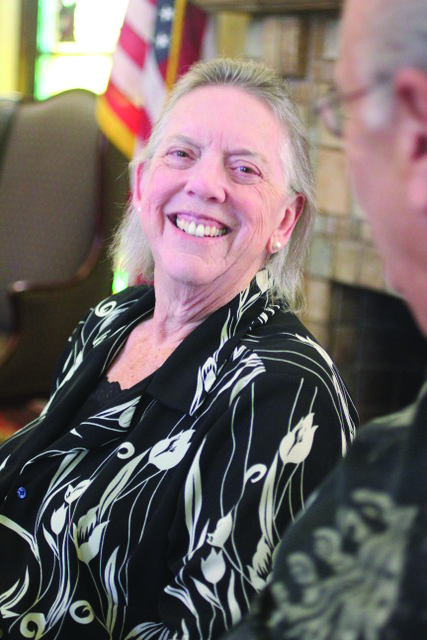Obituary: Carol Stein ’81, MA ’84
Musician, Occupational Therapist, Exemplary Friend.
By Professor Gelya Frank MPW ’16
Former USC faculty member and administrator Carol Stein ’81, MA ’84 died at her home on Feb. 18, 2018, surrounded by family and close friends. She was 77.
A two-time USC alumna, Carol did her master’s research on hand rehabilitation. Together with her thesis committee chairperson Elizabeth J. Yerxa, she published her study, “A Test of Fine Finger Dexterity,” in the American Journal of Occupational Therapy in 1990.
Recognizing Carol’s abundant talents and outstanding personal qualities, Betty Yerxa, then professor and department chair, hired her to serve as administrative assistant and director of admissions. Consequently, Carol participated in the scholarly conversation led by Yerxa that culminated in founding the discipline of occupational science in 1989 and was a co-author on the first OS publication in 1990. Among other things, we can thank Carol Stein for the beautifully apt concept of “orchestration” of people’s daily occupations.
In 1989, Carol took a position at the West Los Angeles Veterans Administration Medical Center with the charge to create an occupational therapy education program. Under her leadership, the program built demand to the point of accepting students from all 50 states. Carol also led the first Commission on Accreditation of Rehabilitation Facilities (CARF) of the WLA VA physical medicine and rehabilitation services unit. She prepared most of the manuals still used in the rehabilitation department.
Carol had become Chief of Occupational Therapy at both the West Los Angeles and Sepulveda VA campuses before retiring in 2009. Her department included almost two dozen occupational therapists, the largest in the entire VA system. She also successfully introduced Tai Chi and Qigong programs, drawing patient referrals from throughout the hospital.
A prodigy, a prognosis
Because of Crohn’s disease beginning in her 20s and neurological disability from later head trauma, the real story of Carol’s professional life goes deeper. Occupational therapy was Carol’s second career.
Carol was a musical prodigy from the age of 3. She was someone for whom her piano teacher, the renowned Natalie Limonick, arranged a session with a couple of visiting UCLA faculty colleagues: violinist Jascha Heifetz and cellist Gregor Piatigorsky. Carol was then 9 years old.
As an undergraduate music major at UCLA, Carol was one of three accompanists — with her teacher Limonick and another instructor — for the Music Department’s Opera Workshop. Carol’s playing was exceptionally musical and lyrical, besides the fact that she could read music almost perfectly on sight.
Laura Fenster, Carol’s friend at UCLA and later piano faculty member at the Sherwood Conservatory in Chicago, recalls a time when Carol accompanied the cello studio: “The cello teacher told his student that the student should play with the same kind of singing tone as the accompanist (Carol), which is totally unheard of. Usually we pianists are told to sound like a string instrument.”
During her life, Carol recounted how, after a major surgery for Crohn’s disease, she overheard a doctor predict that she would not live to see 30. This cruel prognosis seems to have stiffened Carol’s resolve to live her life — then a wife and mother of small children — and to live it beautifully. Two weeks before she died, she said that, in light of that prognosis, she considered every day thereafter to be, in her words, “a gift.”
Not long after the surgery, Carol sustained a head injury in a car accident that affected use of her left hand. It put an abrupt end to her piano career. Against this background of chronic disease and disability, Carol’s quiet dignity and wicked sense of humor especially stand out.
Living a well-orchestrated life
Carol was a delightful friend.
Once, she agreed to give me piano lessons, and I played a piece I had practiced. “How did I do?” I asked. “Beautifully,” she said, “in all three tempos.”
When I was invited to write a chapter for an occupational therapy textbook, I had to have Carol co-author it with me. After all, she had noticed that if we published together, the authors would be Frank and Stein!
Carol’s husband, Philip, comments: “Carol had two major passions in her retirement. First, was knitting. We started going on annual cruises, and her biggest decision was not what to pack to wear, but which knitting project she should bring along. She was determined that before she died, every member of her immediate family would have a hand-knitted fisherman blanket, often more than one, and a good supply of knitted socks.”
Her husband Phil, daughters Amy Poulos and Rebecca Stein, sons-in-law Greg and Rob, and grandson Elijah were not the only beneficiaries. Carol knitted for the friends she loved, and she had many. She made sweaters for Adam and Noah, the sons of her Eritrean-born occupational therapist colleague Letty Woldu and husband Mengis Gebremeskel. Carol considered them her adopted family. I treasure a blue afghan that Carol knitted for me.
As a result of occupational therapy and disciplined practice of Qigong, Carol regained significant fine motor control of her left hand and the stamina to play. Carol and Laura Fenster eventually performed Fantasie in F minor for Piano Four Hands by Franz Schubert in public concert in Chicago.
Carol Stein’s brilliance and good-heartedness were accompanied by a keen critical sensibility. She did not suffer fools and mean-spiritedness. Using her remarkable gifts even with severe loss and limitations, she created an exemplary life. Her story is about many things — among them, the importance of carefully selected and well-orchestrated occupations in achieving a life well lived.
Listen to Stein and Fenster’s 2014 performance of Schubert’s Fantasie in F minor for Piano Four Hands
⋯







